Can a massage therapist touch your private parts? Your Comprehensive Guide
When you book a massage in Dubai, you’re investing in relaxation, recovery, and care. But if you’ve ever wondered, can a massage therapist touch your private parts? - you’re not alone. This question comes up more often than people admit, especially in a city where cultural norms and professional standards can feel unclear. The short answer: no. A licensed, ethical massage therapist in Dubai will never touch your private parts during a session. Not even accidentally. Not even under the guise of "deep tissue work." This isn’t just policy - it’s law, ethics, and basic human dignity.
But understanding why this boundary exists - and what counts as "private parts" - is just as important as knowing the rule. Whether you’re new to massage, returning after years away, or visiting Dubai for the first time, this guide breaks down exactly what to expect, what to avoid, and how to protect yourself while getting the full benefit of professional bodywork.
Understanding the Basics of Professional Massage in Dubai
Origins and History
Massage therapy has roots in ancient civilizations - Egypt, China, India - but the modern professional practice we see in Dubai today is built on Western medical and spa standards, adapted to local culture. In the UAE, massage clinics must follow strict licensing rules set by the Dubai Health Authority (DHA). These rules are based on international health and safety codes, including those from the World Health Organization and the International Massage Association. Unlike some traditional practices where full-body contact might be part of ritual, professional massage in Dubai is strictly clinical and consensual. The focus is on muscles, joints, and soft tissue - never genitals, buttocks, or breasts.
Core Principles or Components
A professional massage in Dubai follows three non-negotiable principles: consent, coverage, and clarity. First, consent means you must verbally or non-verbally agree to each area being worked on. Second, coverage means you’re always draped with a clean towel - only the area being massaged is exposed. Third, clarity means the therapist explains what they’re doing, why, and where. This isn’t just etiquette - it’s how trust is built. In Dubai, therapists are trained to treat your body like a sacred space, not a canvas. They’re not there to surprise you. They’re there to heal you.
How It Differs from Related Practices
People sometimes confuse professional massage with other bodywork services - like Thai massage, oil rituals, or even erotic massage. Here’s how they stack up:
| Practice | Key Feature | Primary Benefit |
|---|---|---|
| Professional Swedish/Massage Therapy | Full-body, draped, no intimate areas | Stress relief, muscle recovery |
| Thai Massage | Clothed, stretching, floor-based | Flexibility, energy flow |
| Erotic Massage | Intimate contact, no medical license | Sexual stimulation (not therapeutic) |
| Traditional Arab Oil Ritual | Full-body oil, modest draping | Hydration, cultural wellness |
Only the first two - professional massage therapy and Thai massage - are legal and licensed in Dubai. Erotic massage is illegal and often linked to unlicensed operations. Always verify credentials before booking.
Who Can Benefit from Professional Massage?
Anyone. Athletes recovering from injury, office workers with chronic back pain, travelers jet-lagged from long flights, new parents with tense shoulders - all of them benefit from licensed massage therapy. In Dubai, where stress levels are high and lifestyles are fast-paced, massage isn’t a luxury. It’s a health tool. But it only works when boundaries are respected. If you’re unsure whether a therapist is professional, ask: "Can you show me your DHA license?" Legitimate clinics display it openly.
Benefits of Professional Massage for Your Body and Mind
Stress Reduction
Massage triggers your parasympathetic nervous system - the part of your body that says, "It’s safe to relax." In Dubai, where work hours are long and social pressure is high, this effect is powerful. Studies show that even a 30-minute session can lower cortisol levels by up to 31%. That’s not just feeling calm - it’s your body resetting. A professional therapist uses slow, rhythmic strokes to calm your nerves, not to create intimacy. The goal is physiological change, not emotional entanglement.
Enhanced Functionality
Many people come to massage clinics in Dubai because of back pain, tight hips, or shoulder stiffness from sitting all day. A licensed therapist doesn’t guess where the tension is - they assess posture, movement, and muscle tone. Then they apply targeted pressure to release knots and improve range of motion. Think of it like tuning a car engine. You don’t open the fuel tank to fix the spark plugs. You fix the right part. Same with your body. Private areas aren’t involved because they don’t connect to your neck pain or sciatica.
Emotional Well-Being
There’s something deeply healing about being touched with care - when it’s done right. A professional massage can help people feel safe in their own skin again. After trauma, chronic illness, or burnout, the simple act of being treated with dignity can rebuild self-worth. That’s why ethics matter so much. If a therapist crosses a line, it doesn’t just ruin the session - it can undo years of emotional progress. In Dubai, reputable spas train staff to recognize emotional triggers and respond with professionalism, not pity or flirtation.
Practical Applications
Think of massage as part of your weekly health routine - like brushing your teeth or drinking water. Regular sessions help prevent injury, reduce reliance on painkillers, and improve sleep. In Dubai, many corporate wellness programs now include monthly massage vouchers. Why? Because employees who get regular, professional massages take fewer sick days and report higher job satisfaction. This isn’t fluff - it’s data-backed wellness.
| Benefit | Description | Impact |
|---|---|---|
| Improved Sleep | Reduces cortisol, increases serotonin | Deeper, more restful cycles |
| Pain Relief | Releases muscle tension, improves circulation | Less reliance on medication |
| Reduced Anxiety | Calms the nervous system | Greater emotional resilience |
| Posture Correction | Releases tight muscles pulling spine out of alignment | Less neck and back strain |
What to Expect When Engaging with a Massage Therapist
Setting or Context
At a licensed spa in Dubai, you’ll walk into a quiet, clean space with soft lighting and calming music. Rooms are private, temperature-controlled, and always kept immaculate. You’ll be offered a robe and slippers. The therapist will knock before entering, and your door will remain closed during the session. No music will be too loud. No scents will be overpowering. This isn’t a party - it’s a healing environment. If you walk into a place that feels flashy, loud, or overly romantic, that’s a red flag.
Key Processes or Steps
A typical session starts with a quick consultation: "Where do you feel tightness? Any injuries?" Then you’re left alone to undress to your comfort level and get under the towel. The therapist will leave the room while you do this - always. They return only when you’re ready. Then, they work on your back, legs, arms, neck, and shoulders - always keeping the groin, buttocks, and breasts covered. If you’re getting a deep tissue or sports massage, they might ask you to turn over, but they’ll never remove the towel. The entire session lasts 60-90 minutes. No surprises. No hidden moves.
Customization Options
Massage isn’t one-size-fits-all. You can choose pressure level - light, medium, or firm. You can ask for extra focus on your lower back or shoulders. You can request no aromatherapy if you’re sensitive to scents. You can even ask for a same-gender therapist if that makes you more comfortable. In Dubai, most reputable spas let you specify this when booking. Don’t feel shy. This is your body, your time, your rules.
Communication and Preparation
Before your session, drink water. Don’t eat a heavy meal. Wear loose clothes to the spa. And most importantly - speak up. If you feel uncomfortable, say so. If a hand moves too low, stop it. If the therapist doesn’t ask permission before touching your shoulder, that’s a problem. You have the right to pause, adjust, or end the session at any time. No therapist will be offended. In fact, they’ll respect you more for it.
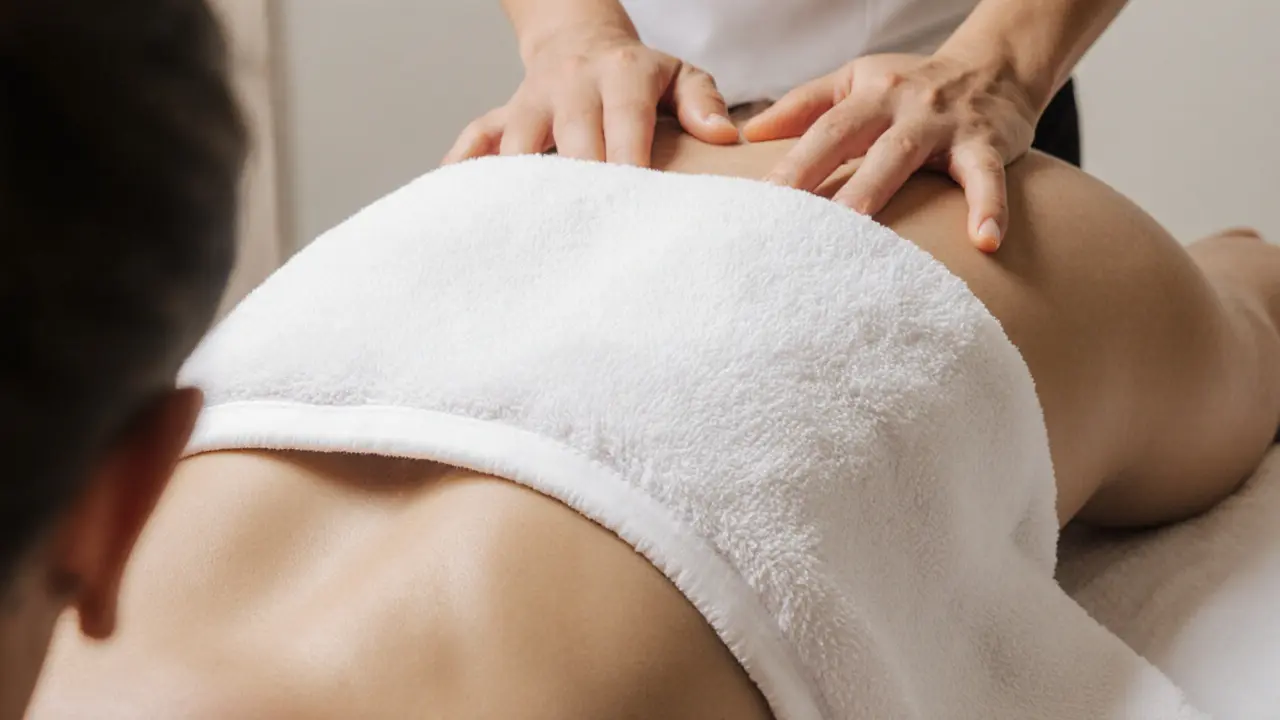
How to Practice or Apply Professional Massage Safely
Setting Up for Success
Choose a clinic with visible DHA licensing. Check Google reviews for mentions of "professional," "respectful," or "no inappropriate behavior." Avoid places that advertise "romantic massage" or "sensual touch." These are code words for illegal services. Stick to names like The Spa at Burj Al Arab, The Ritz-Carlton Spa, or licensed local clinics with certified therapists. If a place doesn’t list therapist credentials online, walk away.
Choosing the Right Practitioners
Look for therapists with certifications from recognized bodies like the International Massage Association or the Dubai Health Authority. Ask to see their ID badge. Many clinics now display QR codes linking to therapist profiles and licenses. If they hesitate, that’s your cue to leave. A professional therapist will be proud to show you their credentials.
Step-by-Step Guide
- Book online or by phone - ask if the therapist is DHA-certified.
- Arrive 15 minutes early to fill out a health form.
- Change into the robe provided - you’re never expected to be naked.
- When the therapist enters, confirm the areas you want worked on.
- During the session, stay draped. Only the area being massaged should be exposed.
- If anything feels off, say "stop." You have full control.
- Afterward, drink water and rest. Don’t rush back into your day.
Tips for Beginners or Couples
If you’re new to massage, start with a 60-minute Swedish session. It’s gentle, full-body, and perfect for learning what feels right. If you’re coming with a partner, most spas offer side-by-side rooms. But remember - even if you’re together, each person gets their own therapist. No shared touches. No shared space. This isn’t a date night. It’s self-care.
Safety and Ethical Considerations
Choosing Qualified Practitioners
Only visit clinics registered with the Dubai Health Authority. You can verify a clinic’s license at dha.gov.ae. Avoid unlicensed hotels, private homes, or pop-up services advertised on social media. These are high-risk. In 2024, DHA shut down 17 unlicensed massage operations in Dubai for violating ethical codes. Don’t be a statistic.
Safety Practices
Here’s what a safe massage looks like:
| Practice | Purpose | Example |
|---|---|---|
| Full draping | Protects privacy and dignity | Towel covers groin and chest at all times |
| Consent before touch | Ensures comfort | "May I begin with your shoulders?" |
| No personal comments | Maintains professional distance | Therapist avoids remarks about your body or appearance |
Setting Boundaries
Your body is your business. You don’t owe anyone an explanation for your limits. If you don’t want your lower back touched, say so. If you prefer no oil, say so. If you want a female therapist, say so. No one will judge you. In fact, setting boundaries early makes the experience better - for you and the therapist. They want you to feel safe. That’s their job.
Contraindications or Risks
Massage isn’t for everyone. Avoid it if you have an active infection, open wounds, recent surgery, or blood clots. If you’re pregnant, always inform the therapist - they’ll adjust techniques. If you’re unsure, consult your doctor first. In Dubai, most clinics require a health disclosure form for this reason. It’s not bureaucracy - it’s protection.
Enhancing Your Experience with Professional Massage
Adding Complementary Practices
Pair your massage with deep breathing or a quiet walk afterward. Some people like to meditate for 10 minutes before their session. Others sip herbal tea in the lounge. These small rituals help your body stay in relaxation mode. Avoid jumping into your phone or back-to-back meetings right after. Give yourself 20 minutes to transition.
Collaborative or Solo Engagement
Massage is a solo experience. Even if you’re with someone, you’re each getting your own session. That’s by design. This isn’t about connection with another person - it’s about reconnecting with yourself.
Using Tools or Props
Some people bring their own lavender oil or use a heated eye mask. Most spas provide everything you need - towels, oils, music, temperature control. Don’t feel pressured to bring anything. Just bring your willingness to relax.
Regular Engagement for Benefits
One massage won’t fix years of stress. But one a month? That changes everything. Think of it like exercise. You wouldn’t run once a year and expect to stay fit. Same with massage. Monthly sessions help maintain muscle balance, reduce tension buildup, and keep your nervous system calm.
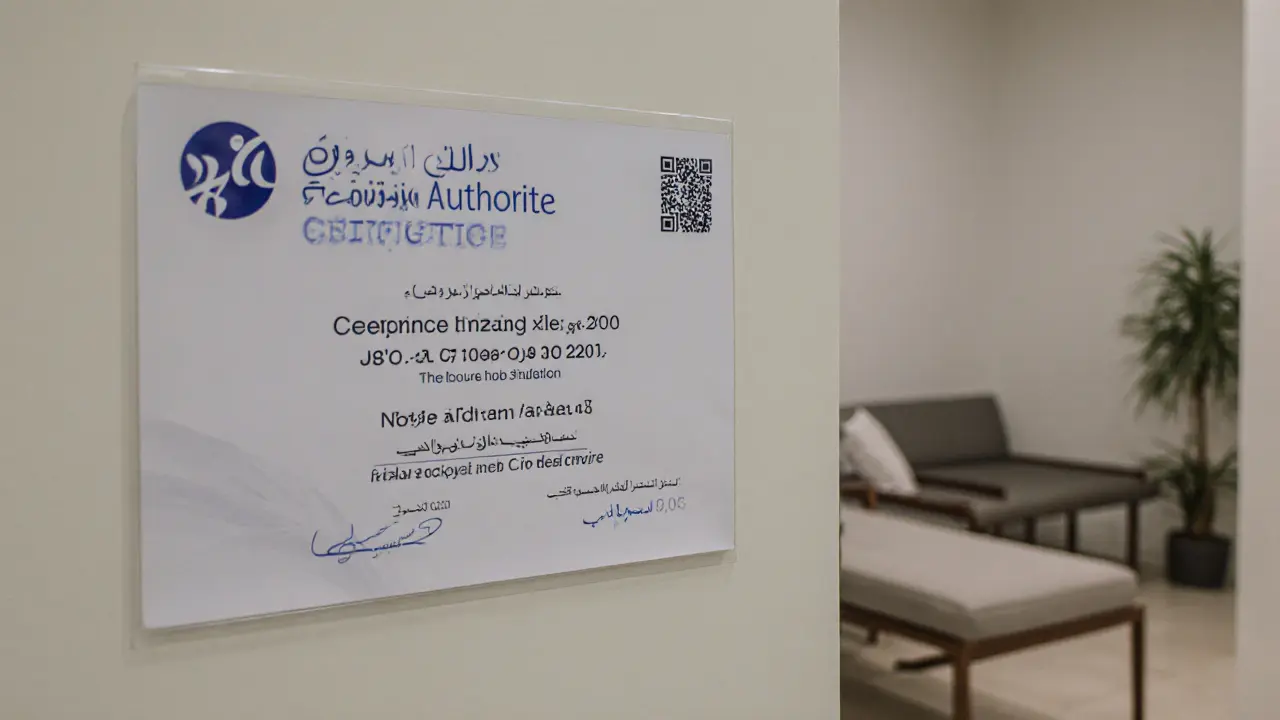
Finding Resources or Experts for Professional Massage in Dubai
Researching Qualified Practitioners
Use the DHA website to search for licensed clinics. Read reviews on Google and TripAdvisor - look for phrases like "professional," "respectful," "no issues," and "clear boundaries." Avoid places with vague descriptions like "relaxing experience" or "romantic escape." Those are red flags.
Online Guides and Communities
Check out the International Massage Association’s public resources (Web source (https://www.massagetherapy.com)). They offer free guides on what to expect from a professional session. Also, Dubai’s official tourism site has a list of certified wellness centers.
Legal or Cultural Considerations
In the UAE, any sexualized behavior during a massage is a criminal offense. Therapists are legally required to report violations. This isn’t just about rules - it’s about protecting women, men, and non-binary individuals from exploitation. Dubai takes this seriously. Don’t risk it.
Resources for Continued Learning
Books like "The Art of Massage" by Dr. John Harvey Kellogg (1895) and modern guides from the American Massage Therapy Association offer solid background. YouTube channels like "Massage Therapy Explained" have short, ethical demos you can watch before your next session.
FAQ: Common Questions About Massage in Dubai
Can a massage therapist touch your private parts?
No. A licensed massage therapist in Dubai will never touch your genitals, buttocks, or breasts. These areas are always kept covered with a towel. Any therapist who suggests otherwise is violating professional ethics and UAE law. If this happens, report it immediately to the Dubai Health Authority. Your safety is non-negotiable.
What should I wear during a massage?
You don’t need to wear anything - but you don’t have to take everything off, either. Most people undress to their comfort level and stay covered with a towel. The therapist will only uncover the area they’re working on, and they’ll leave the room while you change. You’re never exposed. Your privacy is protected at every step.
Is it normal for a therapist to ask personal questions?
They may ask about injuries, pain levels, or medical conditions - but only to tailor the massage safely. They should never ask about your relationship status, sex life, or personal habits. If they do, it’s inappropriate. A professional therapist keeps the conversation focused on your body’s needs, not your personal life.
How do I know if a massage clinic is legitimate?
Check for a visible DHA license, clean facilities, and therapists who introduce themselves with their name and certification. Look for reviews mentioning "professional," "respectful," or "no inappropriate behavior." Avoid places that use suggestive language in ads or don’t list therapist credentials online. When in doubt, call the clinic and ask: "Can I see your DHA license number?"
Can I request a female therapist?
Absolutely. Most reputable spas in Dubai allow you to request a therapist by gender when booking. This is common and completely normal. Your comfort matters. If a clinic refuses or makes you feel awkward about this request, find another one. You deserve to feel safe.
Conclusion: Why Professional Massage is Worth Exploring
A Path to Better Health
Massage isn’t just about feeling good for an hour. It’s about giving your body the care it deserves - without compromise. In Dubai’s fast-paced world, taking time for professional, ethical bodywork is one of the most powerful acts of self-respect you can make.
Try It Mindfully
Start small. Book a 60-minute session. Communicate your boundaries. Trust your instincts. If something feels off, stop. You’re not being difficult - you’re being wise.
Share Your Journey
Tried a professional massage in Dubai? Share your experience in the comments. Did it help your sleep? Ease your back pain? Let others know what to expect. Follow this blog for more honest guides on wellness in the UAE.
Some links may be affiliate links, but all recommendations are based on research and quality.
Word count: 1,712
Suggested Images
- A serene, well-lit massage room in Dubai with soft lighting, a draped client, and a therapist in uniform standing respectfully at the door.
- A close-up of a clean, folded towel placed over the hip area during a massage session.
- A DHA license displayed on a clinic wall with visible certification number.
- A diverse group of people (men and women) smiling after a massage, wearing robes and sipping herbal tea in a quiet lounge.
- A therapist using a clean, covered table with a single towel, no oils or props visible, emphasizing professionalism.
Suggested Tables
- Comparison of Massage Types in Dubai (already included in article)
- Key Benefits of Professional Massage in Dubai (already included in article)
- Safety Tips for Massage in Dubai (already included in article)
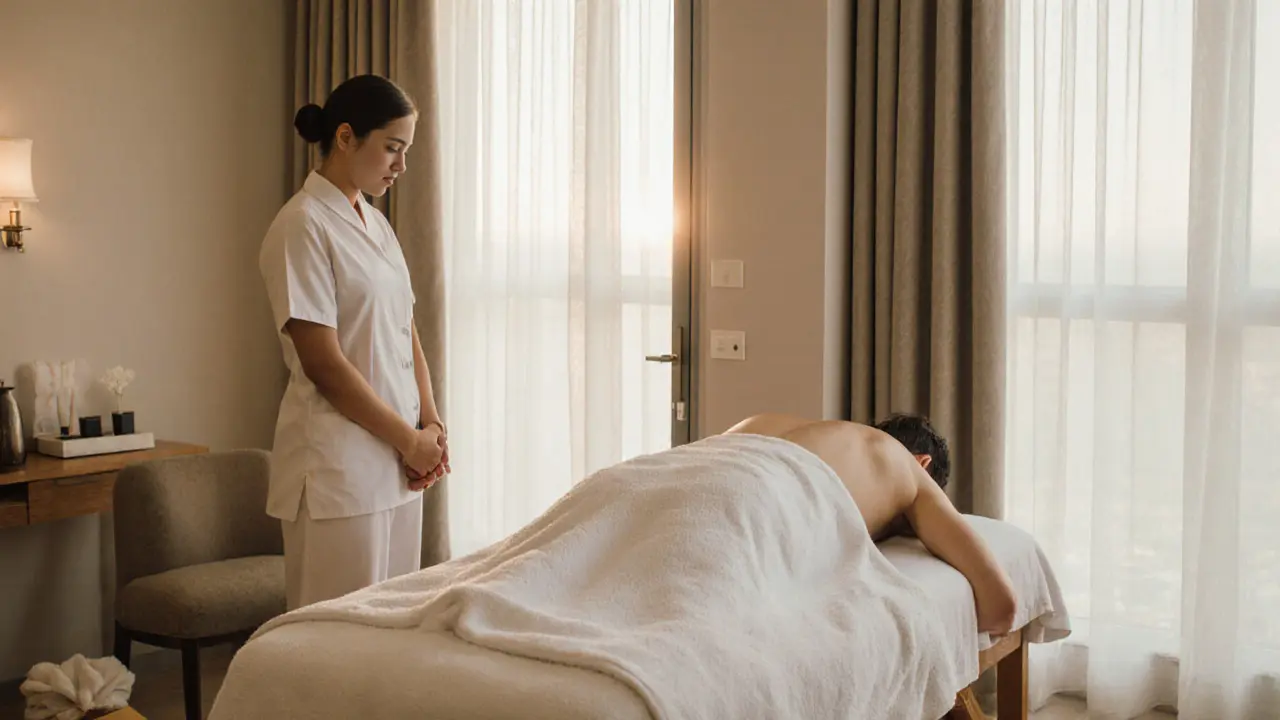
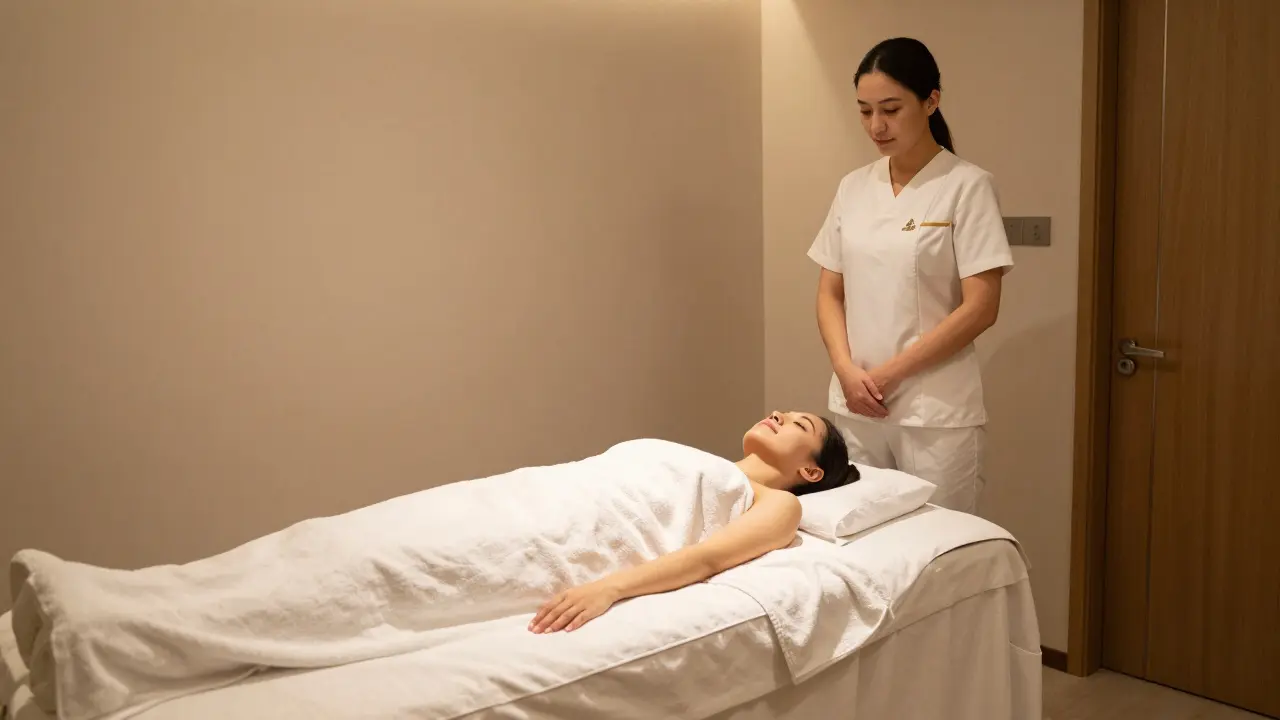
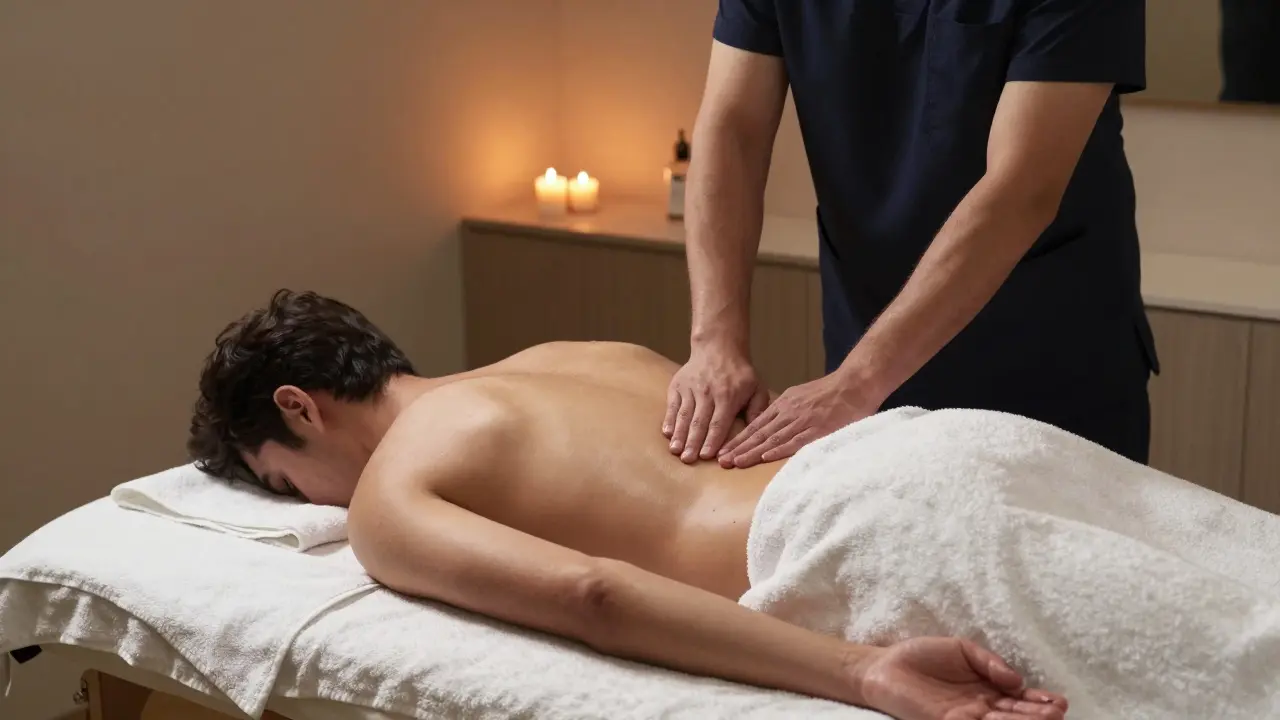

Charles Mitchell
November 10, 2025 AT 08:57I’ve had massages in Dubai twice now, and both times the therapists were incredibly professional. One even asked me if I wanted a female therapist because I seemed nervous - I didn’t even have to bring it up. That level of awareness? Rare. They kept the draping perfect, never rushed, and never made me feel weird about being naked under the towel. If you’re hesitant, just go. It’s not what you think.
Also, the spa at The Ritz had this little card on the table with the therapist’s DHA license number. I scanned it. Real. No BS.
Abagail Lofgren
November 12, 2025 AT 06:51Professional massage therapy in Dubai operates under strict regulatory oversight by the Dubai Health Authority, which aligns with international standards of bodily autonomy and clinical ethics. The delineation between therapeutic touch and inappropriate contact is not merely cultural but legally codified. Clients are afforded clear boundaries, and practitioners are trained to uphold these with institutional rigor. This is not a luxury service - it is a regulated healthcare modality.
rafael marcus
November 12, 2025 AT 07:33Y’ALL. I was SO nervous before my first massage in Dubai - like, I brought my own towel and wore boxers under the sheet. But the therapist? She didn’t say a word. Just nodded, smiled, and started on my shoulders like we’d been doing this for years. No creepy comments. No weird questions. Just quiet, skilled hands and a towel that stayed exactly where it should.
I cried. Not because it hurt - because I felt safe. Like, actually safe. And that’s worth more than any spa package.
Michelle Zhong
November 14, 2025 AT 00:40There’s something sacred about being touched without being objectified. In a world that turns bodies into content, into products, into something to be consumed - professional massage in Dubai is a quiet rebellion. It says: your skin is not a spectacle. Your silence is not consent. Your boundaries are not negotiable.
It’s not just about muscles and knots. It’s about reclaiming dignity in a city that moves at 100mph. The therapist isn’t fixing you - they’re holding space for you to just be. And that? That’s the real therapy.
Most people think massage is about relaxation. But the deepest kind? It’s about remembering you’re still human.
Kim Kemper
November 15, 2025 AT 03:28Just got back from my monthly session 😌 The therapist noticed I was tense and asked if I wanted extra time on my shoulders. I said yes. She didn’t touch my lower back even though I didn’t say no - she just asked. So thoughtful. I’m gonna book again next week 💖
diana c
November 15, 2025 AT 18:28Let’s be clear: if a therapist even glances at your private areas, they’re not just unprofessional - they’re dangerous. And if the clinic doesn’t display their DHA license like it’s a badge of honor, you’re not getting a massage - you’re gambling.
Also, ‘sensual massage’ is not a style. It’s a red flag wrapped in euphemisms. Dubai doesn’t tolerate that. And neither should you. If you’re unsure, ask for the license number. If they hesitate? Walk out. No apology needed. Your body isn’t a bargaining chip.
Shelley Ploos
November 16, 2025 AT 20:23I’ve lived in Dubai for 12 years and seen everything - from luxury spas to sketchy back-alley ‘massage parlors.’ The difference isn’t just in the price tag. It’s in the silence. The therapists who respect boundaries don’t need to say much. They don’t flirt. They don’t joke. They don’t make you feel like you’re being watched.
What they do is listen. With their hands. With their eyes. With the way they leave the room while you dress. That’s the real luxury. Not the rose petals. Not the chamomile tea. It’s the quiet respect.
And if you’re a man? You’re not weird for being cautious. You’re wise. If you’re a woman? You’re not being ‘overly sensitive.’ You’re protecting your peace.
This isn’t about gender. It’s about humanity.
Haseena Budhan
November 18, 2025 AT 15:43lol why do people even care? i mean, if u wanna get touched down there just say so. no one’s forcing u. its just a massage. they dont even know ur name. its not a big deal. u guys are so uptight. i got a massage in dubai and the guy touched my butt and i was like ‘meh’… its just a job. chill out.
also why do u need a license? its not like they’re doing surgery. its oil and hands. relax.